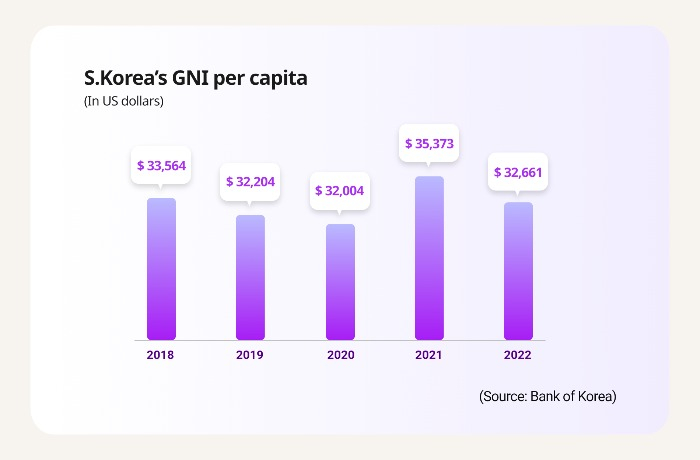Economy
S.Korea lags Taiwan in GNI per capita for first time since 2002
The Korean currency’s sharp depreciation versus the US dollar lowered the country’s average standard of living
By Mar 07, 2023 (Gmt+09:00)
2
Min read
Most Read
LG Chem to sell water filter business to Glenwood PE for $692 million


Kyobo Life poised to buy Japan’s SBI Group-owned savings bank


KT&G eyes overseas M&A after rejecting activist fund's offer


StockX in merger talks with Naver’s online reseller Kream


Mirae Asset to be named Korea Post’s core real estate fund operator



South Korea’s gross national income (GNI) per capita dropped 7.7% on-year last year, coming in below that of its smaller rival Taiwan for the first time in two decades as the local won currency depreciated sharply against the US dollar.
According to preliminary national income data for Asia’s fourth-largest economy released by the Bank of Korea on Tuesday, the country’s per capita GNI for 2022 shrank 7.7% from the previous year to $32,661.
This is a quick reversal from 2021 when the figure topped $35,000 for the first time. The country’s GNI per capita broke the $30,000 mark for the first time in 2017.
Korea’s latest per capita GNI is lower than that of Taiwan, according to the statistics agency of Asia’s seventh-largest economy, which estimated its GNI per capita for last year at $33,565. If confirmed, it will be the first time that Taiwan beats Korea in per capita GNI since 2002.

The Bank of Korea attributed the lower income to the weak Korean won against the US dollar. GNI per capita is the dollar value of a country’s final income in a year divided by its population and an indicator of the standard of living of an average citizen in the country.
The US dollar averaged 1,292 Korean won in 2022, up 12.9% from 1,144 won in 2021.
The sharp depreciation in the Korean won value against the US dollar led to a $4,207 loss in average national income last year, according to the central bank data.
“The New Taiwan dollar/US dollar exchange rate rose 6.8% on average last year but the won/dollar rate gained 12.9%, resulting in the smaller per capita GNI for Korea,” said Choi Jung-tae, head of the national accounts coordination team of the Bank of Korea’s Economic Statistics Department.
Korea’s national income on a Korean won basis gained 4.3% on-year last year to the record high of 42.2 million won. The US dollar ended at 1,300.50 won on Tuesday.
Korea’s GNI would reach $40,000 per capita in the near future if the country’s economy and inflation continue to grow by about 2%, and the dollar-won exchange rate remains around the 10-year average of 1,145, Choi added.
The Bank of Korea also confirmed that Korea’s preliminary real gross domestic product (GDP) expanded 2.6% in 2022 from the prior year but contracted 0.4% on-quarter in the final three months of last year.
By sector, private consumption decreased 0.6% and government spending gained 2.9% in the fourth quarter, while facility investment added 2.7%. Exports and imports fell 4.6% and 3.7%, respectively.
Write to Mi-Hyun Jo at mwise@hankyung.com
Sookyung Seo edited this article.
More to Read
-
 EconomyS.Korea's GNI per capita falls in 2022 on foreign exchange fluctuation
EconomyS.Korea's GNI per capita falls in 2022 on foreign exchange fluctuationJan 18, 2023 (Gmt+09:00)
1 Min read -
 EconomyKorea GNI per capita at record on strong economic growth
EconomyKorea GNI per capita at record on strong economic growthMar 03, 2022 (Gmt+09:00)
2 Min read -

Comment 0
LOG IN


